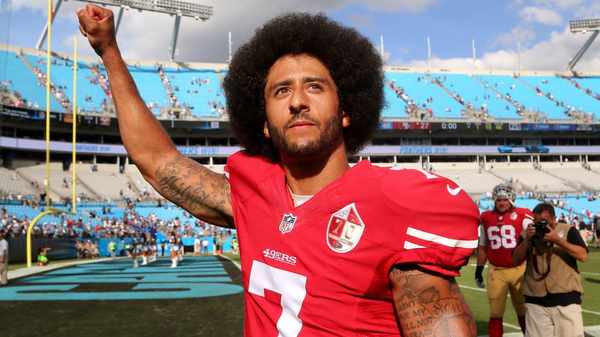

Colin Kaepernick is known for his impactful activism. Kaepernick, a biracial Wisconsin native born to a white mother and a black father before being adopted, initiated a national conversation about the act of standing for the national anthem when he chose not to do so before a preseason game against the Green Bay Packers.
As per TNR, While the inclusion of Black history in educational curricula has been a contentious issue in the United States, conservative factions have recently intensified their efforts to remove books by Black and LGBTQ authors from public schools and libraries. Amid these developments, Colin Kaepernick, akin to Muhammad Ali, Bill Russell, Kareem Abdul-Jabbar, and Jim Brown, has been a champion of this generation for the community, recently unveiling a new anthology.
Kaepernick’s “Our History Has Always Been Contraband: In Defense of Black Studies”
ADVERTISEMENT
Article continues below this ad
In an interview with The New Republic published on Monday, Kaepernick discussed his collaboration with Robin D.G. Kelley and Keeanga-Yamahtta Taylor on a new anthology called ‘Our History Has Always Been Contraband: In Defense of Black Studies.’ He expressed his admiration for Keeanga and Robin’s work, highlighting their unwavering political analysis, and emphasized his belief that “Black liberation simply isn’t possible under capitalism.” When asked about the assumption that Black Studies is exclusively for Black students, Kaepernick asserted, “Despite the claims of even well-meaning and sympathetic pundits, Black Studies courses are not designed to serve Black students alone but all students.”

via Getty
LOS ANGELES, CALIFORNIA – OCTOBER 28: Colin Kaepernick speaks onstage during the Netflix Limited Series “Colin in Black and White” Premiere at Los Angeles County Museum of Art on October 28, 2021 in Los Angeles, California. (Photo by Leon Bennett/Getty Images for Netflix)
He said that Black Studies is not aimed at boosting self-esteem or inducing guilt among students, nor is it merely a superficial diversity project. He further emphasized, “Black Studies is for everyone: Black students, non-Black students of color, Indigenous students, and white students.” He continued by saying that it is crucial to emphasize that for white individuals to genuinely support the Black freedom movement without inadvertently causing harm, it is essential to actively cultivate a deep understanding of Black history and foster authentic relationships with Black people. This process is necessary to navigate allyship and support without unknowingly perpetuating harm or reinforcing harmful systems.
While Colin Kaepernick’s activism has been pivotal for this generation of athletes, it has also impacted his entire football career.
Why did Colin Kaepernick stop playing football?
During a preseason game between the San Francisco 49ers and the Green Bay Packers on August 26, 2016, Colin Kaepernick, who was the quarterback for the 49ers at the time, made the decision not to stand during the national anthem. His protest was a response to police brutality against the African-American community. Instead of standing, Kaepernick chose to kneel while the anthem played. This act of protest continued throughout the 2016 NFL season, drawing both praise and criticism. Kaepernick’s protest garnered support from various athletes in the United States, including Olympic gold medalist Simone Manuel.
ADVERTISEMENT
Article continues below this ad

However, he also faced significant criticism for what some perceived as disrespect towards the United States, including the then-US President, particularly the armed forces. Following the 2016 season, Kaepernick was informed by the 49ers that he would be released by the team. On March 3, 2017, he decided to opt out of his contract with the 49ers, entering free agency. Despite expectations that he would be signed by another team for the 2017 season, Kaepernick did not find another opportunity in the NFL. By that point, he had established himself as a prominent political activist.
Read more: Is Colin Kaepernick going to land up in the XFL?
ADVERTISEMENT
Article continues below this ad
According to reports, Kaepernick currently has no plans to return to the NFL, much to the disappointment of his fans.
Watch this story: 2x Super Bowl Champion Patrick Mahomes’ Unforgettable Coors Light Ad Captivates the NFL Universe

